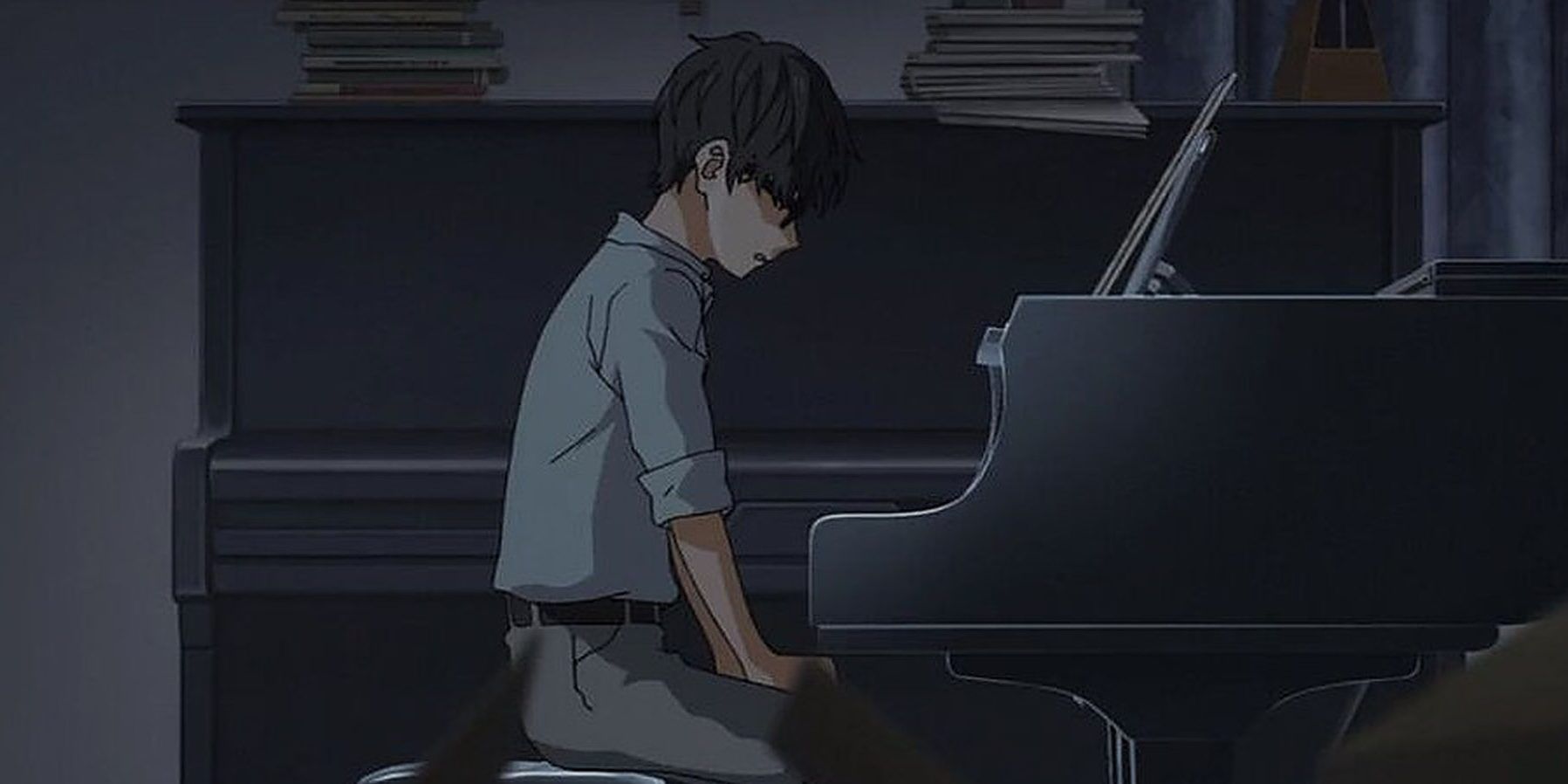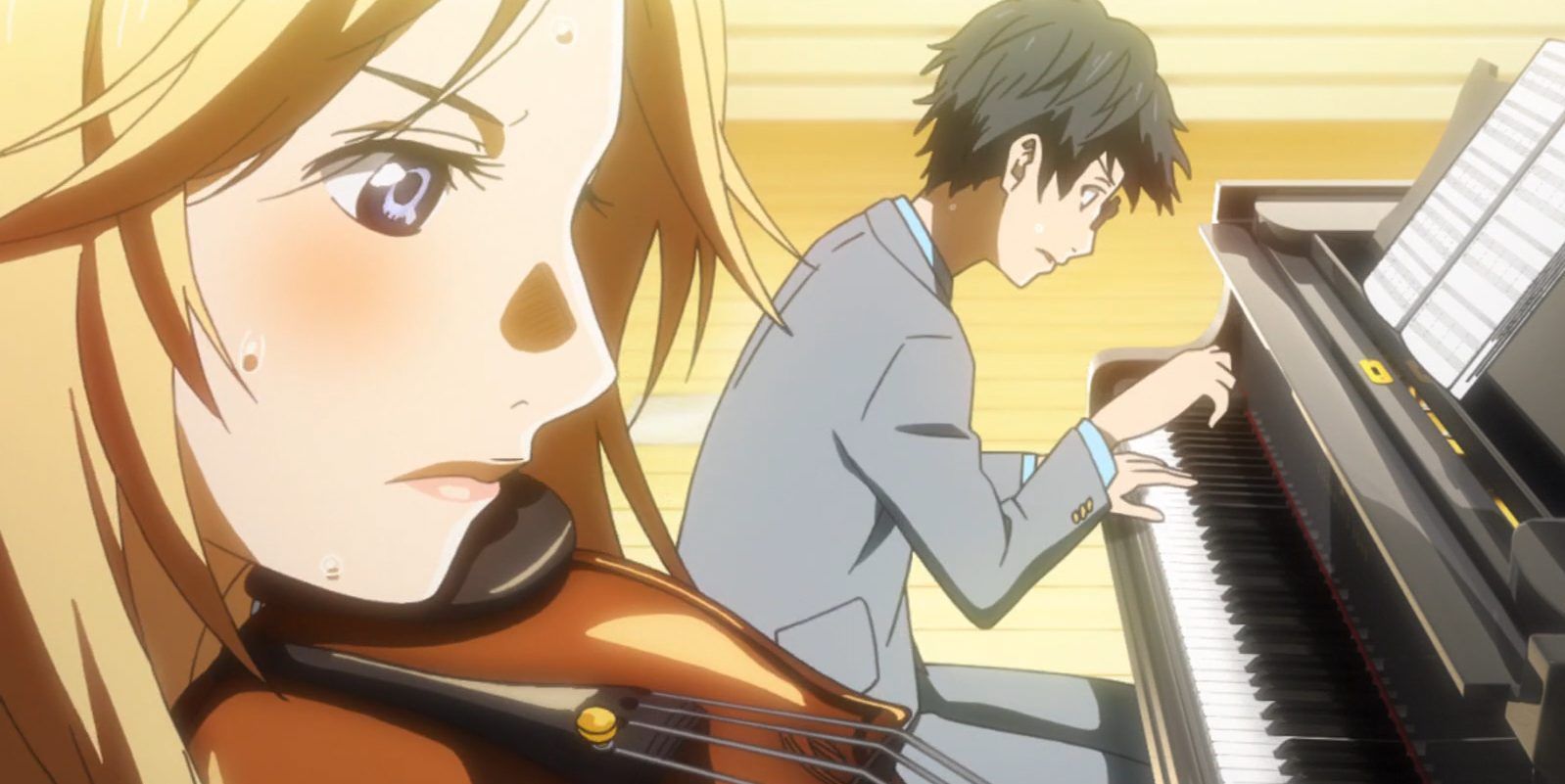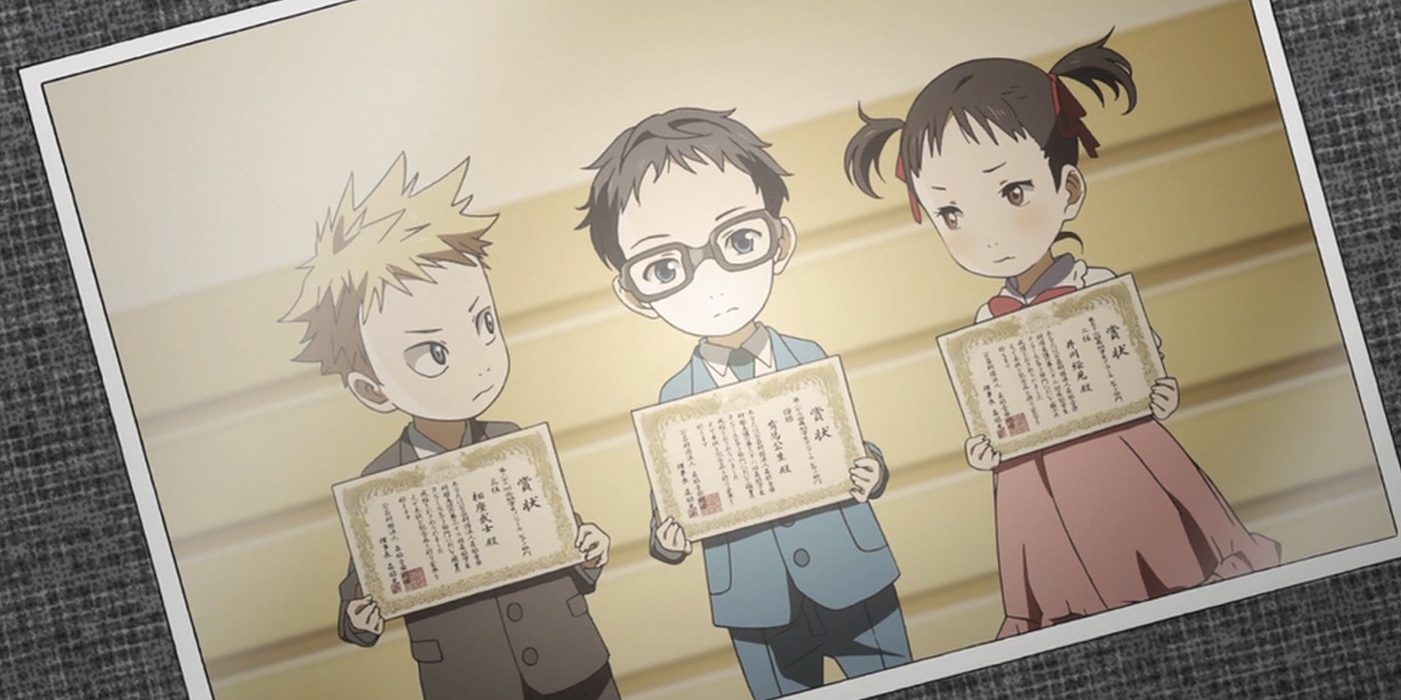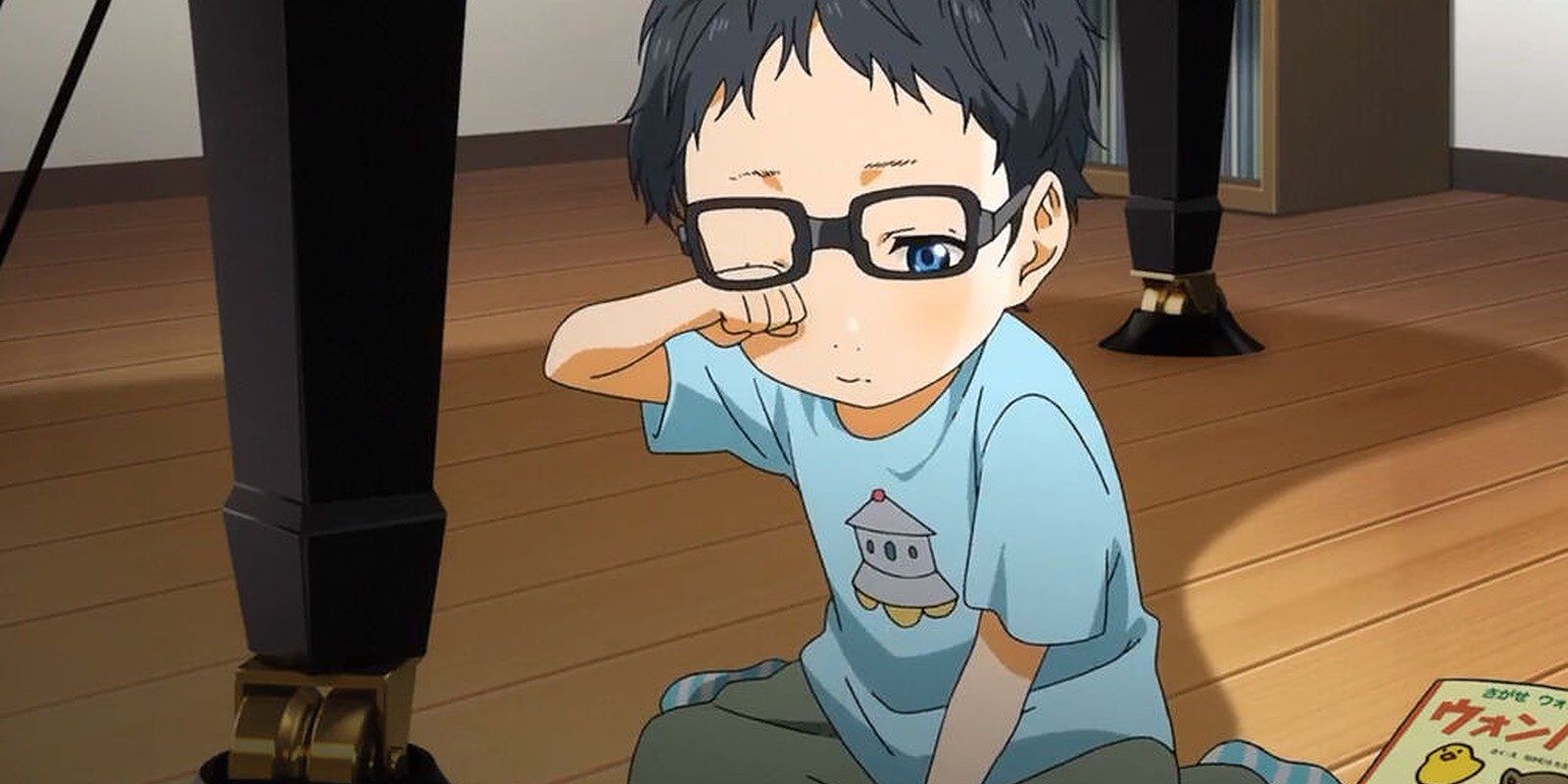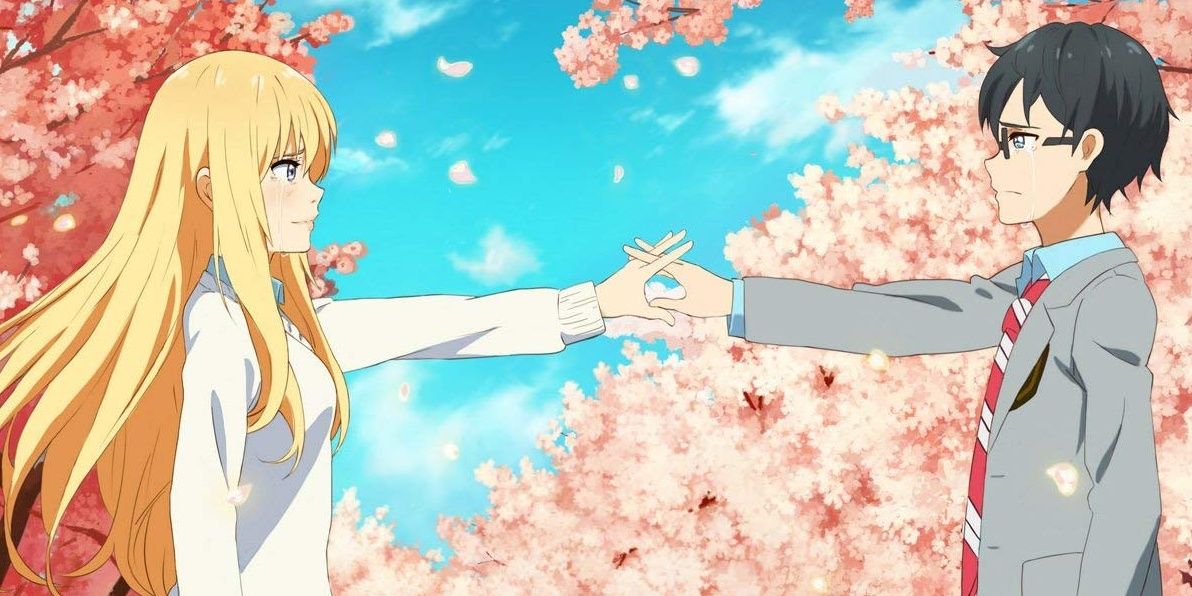Music is an important part of any cinematic experience, but for the anime Your Lie in April, it is central to the storyline and what brings every character together. Considered one of the saddest stories in anime, this musical drama uses real-life classical music pieces to elevate the emotions of the characters and express what cannot be said in words. It tells a story about a deep love for music, heartbreaking loss, childhood trauma, growing up, and letting go, as former pianist prodigy Arima Kousei overcomes his "curse" of being unable to hear the notes when he plays and reenters the beautiful world of classical music after a two-year hiatus.
He is inspired to do so after meeting the beautiful free-spirited violinist Miyazono Kaori. This anime focuses on classical instrumental music and showcases compositions by composers such as Mozart, Beethoven, and Debussy. These compositions are utilized during competitions and special moments in the show in clever to add another emotional layer to the storytelling. Here are some examples of how the music enriches the storyline.
The first piece of classical music viewers are introduced to is the fast and difficult third movement of Beethoven's Moonlight Sonata. In the story, Kousei played this piece during the final round of his last piano competition, right after his mother's passing. Its unquestionable frantic sorrow is used to elevate the first major occurrence of his curse and is further emphasized as the music sounds as if the pianist is desperately preventing themselves from sinking. Kousei too can be seen drowning as the sound of his own playing leaves him.
In contrast, Kaori performed Beethoven's Violin Sonata No. 9 in the first round of the violin competition and is the first piece that Kousei heard her play. She started performing the piece as written, and suddenly started wildly improvising, captivating the audiences and infuriating the judges. In classical music, it is unheard of to improvise unless specifically stated. This piece highlighted her precision and accuracy and eventual boldness and authenticity. She doesn't care what people think as she plays music purely from her soul. The passion in her music was clear throughout the entire performance, and Kousei is almost immediately enamored by her.
Saint Saëns' Introduction and Rondo Capriccioso is the piece they presented together during a violin competition. It was their first duet together, and they were quite an odd pair. With Kousei's mechanical precision supporting Kaori's free-spirited unpredictability, this piece did an excellent job of showcasing the struggle to stay synchronized. Initially, Kousei remained steadfast in following Kaori's sporadic tempos, but he lost his synergy with Kaori and started to drown Kaori's violin with his volume.
Eventually, Kousei stopped, but Kaori kept playing. When Kousei finally summoned the courage to rejoin her, the music started to sound like they are battling each other. In the audience, the judges pointed out that musically they were also fighting each other by not agreeing on a tempo and described it as an entrancing fistfight. By the end, they finished strong as Kousei finally caught up to Kaori. The audience burst into roaring applause and they made it through to the next round.
When Kaori convinced Kousei to play in a piano competition, Kousei chose to play Chopin's Etude Op. 25, No.5, Wrong Note. It is written to sound like the player is hitting a wrong note due to the amount of dissonance in the piece, hence the title. In picking this piece, this may have been his way of showing them intentionally that he was not who he once was, or a way for him to intentionally take back control of his own playing. During his performance, he faced his demons about how tainted his love of piano was due to his mother's abuse. He lost his hearing again, but while desperately clinging to the notes, he remembered how he felt playing with Kaori and dedicated his performance to her. Through this, he found new strength and finished the piece with pristine musicality.
Kreisler's Old Viennese Melodies, Love's Sorrow held a lot of emotional significance to Kousei and is the piece that Kaori chose to play with him for the next round of the violin competition. Kousei held fond memories of his mother playing it as he fell asleep under the piano. He considered it his lullaby, but because of his trauma with his mother, it triggered his curse quite easily. Kaori failed to show up to the competition due to her declining health, and alone on stage, he is inspired to play his childhood lullaby.
Initially, his playing sounded frustrated, probably stemming from the trauma he associated with the act of playing the piano. As he wrestled with his emotions, he decided to start to play it as his mother would have played it, and the notes began to sparkle. In his inner monologue, he realized his mother was upset with him because she was desperate to ensure his future in being a pianist. Through this, he was able to finally remove the antagonizing feelings he had against his mother and started to embrace the music rather than just play it.
Kousei was also seen playing Debussy's Clair De Lune after he walks in on his childhood friend Tsubaki trying to plunk it out on the piano. As Kousei began to play, Tsubaki realized the feelings that she has for Kousei, lamenting about how he is planning on moving away for college. They were in a practice room at night, which was fitting since Clair De Lune translates to the word moonlight. Kousei pointed out how big the moon was as he played, and he inadvertently accompanied Tsubaki as she realized everyone is growing apart. Clair De Lune did a great job demonstrating the bittersweet loneliness that this moment brings.
The last piece of the series is played by Kousei during the finals of the piano competition. One of Chopin's loneliest pieces, Ballade No. 1 in G minor, Op. 23 starts with an unquestionable sorrow. Despite this, he reflected on all the people in his life who make it feel fuller while he played. He recognized that he is not alone, and for a brief moment he imagined Kaori playing with him again as the song starts taking a lighter turn. His music was sparkling again, but as Kaori's health took a turn for the worst, her apparition starts to disappear. As the music started to turn into something more agonizing, he begged Kaori to stay. Her apparition looked back and disappeared into the cosmos as the final notes of the piece rung out in utter agony. He looked up with tears in his eyes, and the scene shifted to the aftermath of her funeral.
Together, these pieces along with the heartbreaking storyline are a recipe for a masterpiece of an anime. Each piece used is intentionally placed into the storyline like an emotional puzzle piece and is used to raise the emotional stakes. Kousei often lamented that he was not good with words, so most of his emotional communication was seen through his piano playing. Music is such an important aspect of anime, and this shows that it can be used more than just for the atmosphere.
Your Lie in April is available to stream on Netflix and Hulu.


